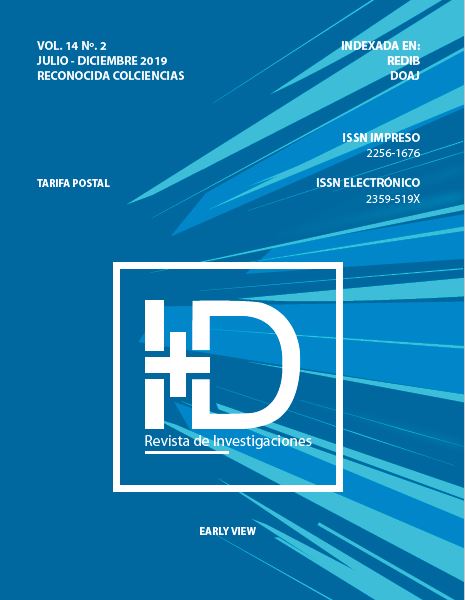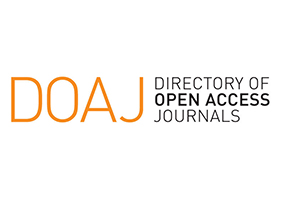Gestión de la cadena de suministros y productividad en la literatura científica
DOI:
https://doi.org/10.33304/revinv.v14n2-2019004Palabras clave:
Gestión de la cadena de suministro, desarrollo sostenible, logística, gestión de la cadena de suministro verde, big dataResumen
Este artículo tiene como objetivo presentar los resultados de la revisión de la literatura científica de la gestión de la cadena de suministros con el fin de establecer los temas de interés vigentes y los que emergen actualmente dado su relevancia para la comunidad científica. En el estudio se tuvieron en cuenta tres escenarios de tiempo: actualidad, mediano y largo plazo. En cada intervalo de tiempo se logra identificar la cantidad de artículos publicados y los temas que aparecen en mayor número de veces. Finalmente se obtiene una recopilación de los autores con mayor relevancia y los temas que abordan, considerando como relevante el número de citaciones del artículo hasta el momento y los índices de factor de impacto del artículo en la revista científica. Adicionalmente, se detecta que los subtemas de investigación: desarrollo sostenible, gestión de la cadena de suministro verde, logística, toma de decisiones, gestión ambiental, sostenibilidad y big data, son tendencia de investigación en el ámbito científico a nivel global.Descargas
Citas
Albrecht, M. (2010). Supply chain coordination mechanisms: New approaches for collaborative planning. Lecture Notes in Economics and Mathematical Systems, 628, 1-211. https://doi.org/10.1007/978-3-642-02833-5_1
Azadi, M., Jafarian, M., Saen, R. F., & Mirhedayatian, S. M. (2015). A new fuzzy DEA model for evaluation of efficiency and effectiveness of suppliers in sustainable supply chain management context. Computers and Operations Research, 54, 274-285. https://doi.org/10.1016/j.cor.2014.03.002
Brandenburg, M., & Rebs, T. (2015). Sustainable supply chain management: A modelling perspective. Annals of Operations Research, 229(1), 213-252. https://doi.org/10.1007/s10479-015-1853-1
Chen, D. Q., Preston, D. S., & Swink, M. (2015). How the use of big data analytics affects value creation in supply chain management. Journal of Management Information Systems, 32(4), 4-39. https://doi.org/10.1080/07421222.2015.1138364
Chen, I. J., & Paulraj, A. (2004). Towards a theory of supply chain management: the constructs and measurements. Journal of Operations Management, 22(2), 119-150. https://doi.org/10.1016/j.jom.2003.12.007
Correa, A. A., & Gómez, R. A. (2009). Tecnologías de la información en la cadena de suministro. DYNA, 76(157), 37-48.
Craighead, C. W., Blackhurst, J., Rungtusanatham, M. J., & Handfield, R. B. (2007). The Severity of Supply Chain Disruptions: Design Characteristics and Mitigation Capabilities. Decision Sciences, 38(1), 131-156. https://doi.org/10.1111/j.1540-5915.2007.00151.x
De Matos, A. L. T., Pires, S. R. I., & Vivaldini, M. (2017). Product development: The supply chain management perspective. International Journal of Business Innovation and Research, 13(1), 52-67. https://doi.org/10.1504/IJBIR.2017.083265
Dey, P., & Cheffi, W. (2013). Managing supply chain integration: Contemporary approaches and scope for further research. Production Planning and Control, 24. https://doi.org/10.1080/09537287.2012.666841
Dubey, R., Gunasekaran, A., Papadopoulos, T., Childe, S. J., Shibin, K. T., & Wamba, S. F. (2017). Sustainable supply chain management: framework and further research directions. Journal of Cleaner Production, 142, 1119-1130. https://doi.org/10.1016/j.jclepro.2016.03.117
Esfahbodi, A., Zhang, Y., & Watson, G. (2016). Sustainable supply chain management in emerging economies: Trade-offs between environmental and cost performance. International Journal of Production Economics, 181, 350-366. https://doi.org/10.1016/j.ijpe.2016.02.013
Fadile, L., El Oumami, M., & Beidouri, Z. (2018). Logistics outsourcing: A review of basic concepts. International Journal of Supply Chain Management, 7(3), 53-69.
Fahimnia, B., Sarkis, J., & Davarzani, H. (2015). Green supply chain management: A review and bibliometric analysis. International Journal of Production Economics, 162, 101-114. https://doi.org/10.1016/j.ijpe.2015.01.003
Fahimnia, B., Tang, C. S., Davarzani, H., & Sarkis, J. (2015). Quantitative models for managing supply chain risks: A review. European Journal of Operational Research, 247(1), 1-15. https://doi.org/10.1016/j.ejor.2015.04.034
Formentini, M., & Taticchi, P. (2016). Corporate sustainability approaches and governance mechanisms in sustainable supply chain management. Journal of Cleaner Production, 112, 1920-1933. https://doi.org/10.1016/j.jclepro.2014.12.072
Genovese, A., Acquaye, A. A., Figueroa, A., & Koh, S. C. L. (2017). Sustainable supply chain management and the transition towards a circular economy: Evidence and some applications. Omega (United Kingdom), 66, 344-357. https://doi.org/10.1016/j.omega.2015.05.015
Gil, S., Gonzales, J., & Nuñez, J. (2018). Modelo de Negocios para la Gestión de la Cadena de Suministro: Una revisión y Análisis bibliométrico. I+D Revista de Investigaciones, 11(1),39-59. https://doi.org/10.33304/revinv.v11n1-2018004
Gómez, R. A., Cano, J. A., & Campo, E. A. (2016). Selección de proveedores en la minería de oro con lógica difusa. Revista Venezolana de Gerencia, 21(75). Disponible en: <http://www.redalyc.org/articulo.oa?id=29048812010> ISSN 1315-9984
Gómez, R. A., Zuluaga, A., & Fernández, S. A. (2014). Indicadores logísticos en la cadena de suministro como apoyo al modelo scor. Clío América, 8(15), 90. https://doi.org/10.21676/23897848.832
Heikkilä, J. (2002). From supply to demand chain management: Efficiency and customer satisfaction. Journal of Operations Management, 20(6), 747-767. https://doi.org/10.1016/S0272-6963(02)00038-4
Hitchcock, T. (2012). Low carbon and green supply chains: The legal drivers and commercial pressures. Supply Chain Management: An International Journal, 17, 98-101. https://doi.org/10.1108/13598541211212249
Jabbour, C. J. C., & De Sousa Jabbour, A. B. L. (2016). Green Human Resource Management and Green Supply Chain Management: Linking two emerging agendas. Journal of Cleaner Production, 112, 1824-1833. https://doi.org/10.1016/j.jclepro.2015.01.052
LeMay, S., Helms, M. M., Kimball, B., & McMahon, D. (2017). Supply chain management: the elusive concept and definition. The International Journal of Logistics Management, 28(4), 1425-1453. https://doi.org/10.1108/IJLM-10-2016-0232
León, O., & Palma, E. (2018). Aplicación de las Tecnologías de Información y Comunicación en los procesos de innovación empresarial. Revisión de la literatura. I+D Revista de Investigaciones, 11(1), 156-166. https://doi.org/10.33304/revinv.v11n1-2018012
Luthra, S., Garg, D., & Haleem, A. (2015a). An analysis of interactions among critical success factors to implement green supply chain management towards sustainability: An Indian perspective. Resources Policy, 46, 37-50. https://doi.org/10.1016/j.resourpol.2014.12.006
Luthra, S., Garg, D., & Haleem, A. (2015b). Critical success factors of green supply chain management for achieving sustainability in Indian automobile industry. Production Planning and Control, 26(5), 339-362. https://doi.org/10.1080/09537287.2014.904532
Meixell, M. J., & Luoma, P. (2015). Stakeholder pressure in sustainable supply chain management: A systematic review. International Journal of Physical Distribution and Logistics Management, 45, 69-89. https://doi.org/10.1108/IJPDLM-05-2013-0155
Quarshie, A. M., Salmi, A., & Leuschner, R. (2016). Sustainability and corporate social responsibility in supply chains: The state of research in supply chain management and business ethics journals. Journal of Purchasing and Supply Management, 22(2), 82-97. https://doi.org/10.1016/j.pursup.2015.11.001
Rostamzadeh, R., Govindan, K., Esmaeili, A., & Sabaghi, M. (2015). Application of fuzzy VIKOR for evaluation of green supply chain management practices. Ecological Indicators, 49, 188-203. https://doi.org/10.1016/j.ecolind.2014.09.045
Schoenherr, T., & Speier-Pero, C. (2015). Data science, predictive analytics, and big data in supply chain management: Current state and future potential. Journal of Business Logistics, 36(1), 120-132. https://doi.org/10.1111/jbl.12082
Silvestre, B. S. (2015). Sustainable supply chain management in emerging economies: Environmental turbulence, institutional voids and sustainability trajectories. International Journal of Production Economics, 167, 156-169. https://doi.org/10.1016/j.ijpe.2015.05.025
Sitek, P., & Wikarek, J. (2015). A hybrid framework for the modelling and optimisation of decision problems in sustainable supply chain management. International Journal of Production Research, 53(21), 6611-6628. https://doi.org/10.1080/00207543.2015.1005762
Su, C.-M., Horng, D.-J., Tseng, M.-L., Chiu, A. S. F., Wu, K.-J., & Chen, H.-P. (2016). Improving sustainable supply chain management using a novel hierarchical grey-DEMATEL approach. Journal of Cleaner Production, 134(Part B), 469-481. https://doi.org/10.1016/j.jclepro.2015.05.080
Taticchi, P., Garengo, P., Nudurupati, S. S., Tonelli, F., & Pasqualino, R. (2015). A review of decision-support tools and performance measurement and sustainable supply chain management. International Journal of Production Research, 53(21), 6473-6494. https://doi.org/10.1080/00207543.2014.939239
Tseng, M., Lim, M., & Wong, W. P. (2015). Sustainable supply chain management: A closed-loop network hierarchical approach. Industrial Management and Data Systems, 115(3), 436-461. https://doi.org/10.1108/IMDS-10-2014-0319
Whitten, G. D., Kenneth Jr., W. G., & Zelbst, P. J. (2012). Triple-A supply chain performance. International Journal of Operations and Production Management, 32(1), 28-48. https://doi.org/10.1108/01443571211195727
Wu, L., Yue, X., Jin, A., & Yen, D. C. (2016). Smart supply chain management: A review and implications for future research. International Journal of Logistics Management, 27(2), 395-417. https://doi.org/10.1108/IJLM-02-2014-0035
Zhong, R. Y., Newman, S. T., Huang, G. Q., & Lan, S. (2016). Big Data for supply chain management in the service and manufacturing sectors: Challenges, opportunities, and future perspectives. Computers and Industrial Engineering, 101, 572-591. https://doi.org/10.1016/j.cie.2016.07.013












